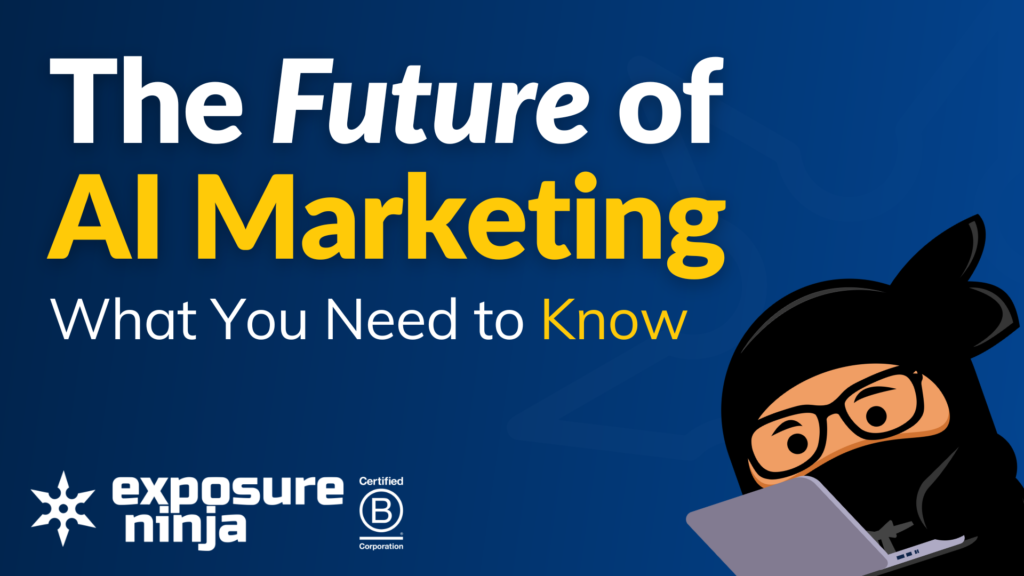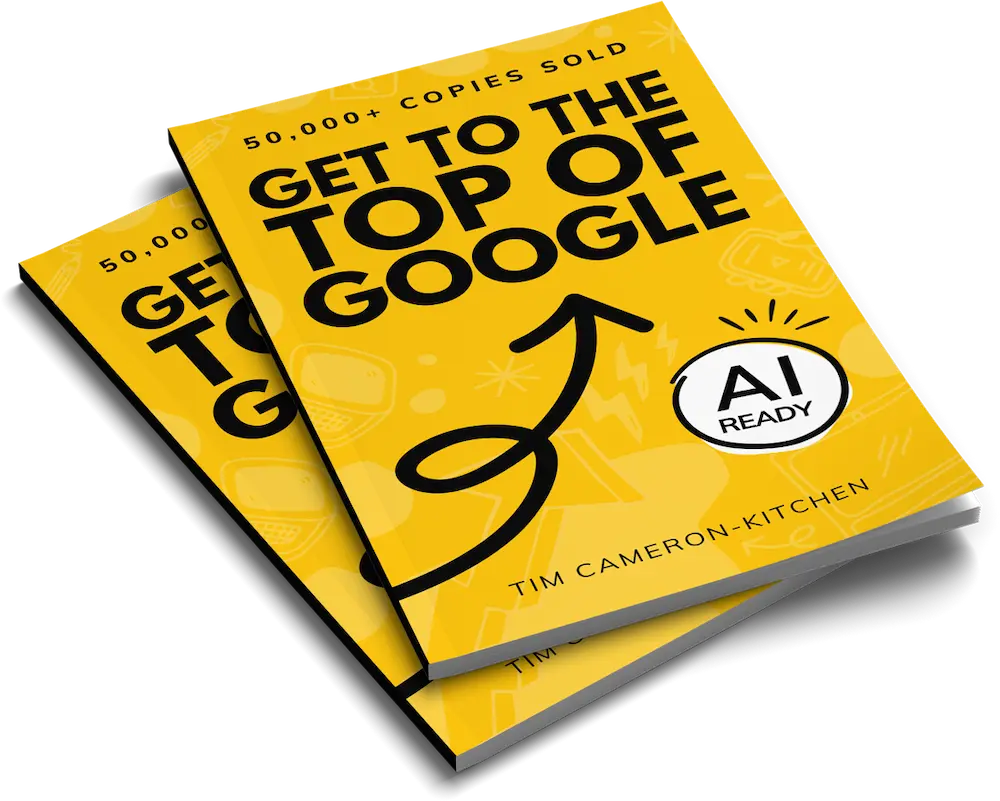
Get Weekly Marketing Tips
Join 30,000+ marketers and get the best marketing tips every week in your inbox
Struggling with AI marketing?
Keeping up with the tools, changes and industry-shattering implications of this technology can be challenging.
But let’s face it — AI is having a massive impact on the marketing world, and it’s here to stay. In fact, 80% of marketers believe that AI will revolutionise the industry, so you don’t want to be left behind.
At Thinkplus, we’re AI aficionados, so we created a comprehensive guide to AI marketing for AI beginners and marketers looking to take their AI skills to the next level.
This guide is packed with actionable insights that will help you upgrade your mindset with the power of AI.
So, are you ready to witness the rise of the machines?
We mean, are you ready to dive headfirst into the world of AI marketing?
Then let’s get started.
Struggling to know how to use AI with your marketing?
Download a free copy of AI Marketing: Everything You Need to Know and get immediately up-to-speed

What Is AI Marketing?
In short: Artificial Intelligence marketing involves using robots (well, kinda) to power up your marketing activities.
In long: AI tools are trained using web content, meaning they “read” more content than a human ever could. This gives them a deep understanding of nearly every topic imaginable, including marketing techniques and strategies.
AI marketing tools can automate repetitive tasks such as email marketing, social media posting and ad targeting. They can also be used to personalise marketing messages and content based on individual customer preferences and behaviours — making content writing easier.
These AI tools include AI chatbots (think ChatGPT, Bing Chat and Google Bard), predictive analytics, natural language processing and image and speech recognition. Marketers can use these tools to better understand our target audience, optimise our campaigns and drive more conversions and revenue.
Despite the immense benefits of AI marketing, some marketers are hesitant to adopt these technologies.
We get it; AI can seem intimidating with worries about cost, complexity and privacy.
But with the right approach and guidance (cue the wonderful Ninjas), AI marketing can be a powerful tool for businesses of all sizes to improve marketing efforts and stay ahead of the competition.
Common AI Marketing Terms
AI marketing comes with many new terminologies that AI-savvy people use in their everyday language…leaving anyone who isn’t up to date on the lingo confused.
Here are some of the most common AI terms that marketers will encounter.
Generative AI
Generative AI is a type of AI that generates new content or data, such as text, images or even video. It uses algorithms and models to learn from existing data (machine learning) and then creates new content based on that learning.
AI Prompts
Prompts are short pieces of text or questions given to an AI tool to generate a response. Prompts guide the model in a specific direction or provide context for the generated output.
Large Language Model (LLM)
A large language model is a machine learning model trained on vast amounts of data to generate human-like text or speech. Examples include GPT-4 and BERT.
Natural Language Processing (NLP)
Natural language processing is a branch of AI focusing on the interaction between computers and human languages. It involves using algorithms to analyse, understand and generate human language. Examples include ChatGPT, Bing Chat and Google Bard.
AI Hallucination
AI hallucination is a term used to describe when a machine learning model generates an output completely unrelated to the input or data it was trained on. This can result in inaccurate stats or information being included in the AI’s responses.
Common Misconceptions about AI and Marketing
Artificial intelligence is complicated and often misunderstood, leading to common misconceptions about its use in marketing.
Let’s explore and debunk a few myths.
AI will replace human marketers: This is far from the truth. AI tools should be used to assist human marketers, not replace them. With the right strategy, AI can help marketers make better decisions and optimise campaigns.
AI can do everything on its own: While AI can automate some tasks, it still requires human input and supervision. Human marketers are needed to check data analysis, create strategies and adjust campaigns. AI Chatbots and content tools have a habit of confidently lying in their responses, meaning some stats and information will need to be fact-checked by humans before publishing.
AI is too complex and difficult to use: Many AI tools are user-friendly and don’t require technical knowledge. With proper training and guidance, marketers can quickly learn how to use AI tools.
By understanding these misconceptions, you can make informed decisions about which AI tools to use and how to incorporate them into your marketing strategies.
AI is a useful tool for us marketers — not an enemy.
Is your marketing underperforming?
Request a free website and marketing review and our team will tell you how to improve your marketing.


AI Uses for Marketers
AI is an incredibly versatile tool in marketing with a wide range of uses.
Even if you’re unaware of it, you may already use AI in your daily marketing activities.
For instance, Google and Meta’s ads utilise AI to optimise ad placement and ensure your ads reach the right audience at the right time. This is just one example of how AI can help streamline your marketing efforts and drive better results.
Other uses of AI in marketing include:
- Content generation
- Customer support chatbots
- Predictive analytics
- Personalisation.
Content Generation
AI-generated content can be a lifesaver for marketers who need to produce a high volume of content in a short amount of time.
With the help of natural language generation (NLG) technology, AI can analyse data and turn it into written content that sounds like it was written by us squishy humans.
AI-powered content generators can save marketers time and resources by creating product descriptions, blog posts, email subject lines and more. Plus, they can use machine learning to analyse data and identify patterns that can be used to generate even more content ideas.
It’s like having a mini digital writing assistant on your team!
But let’s be real. AI-generated content isn’t perfect (far from it at times). That’s why it’s vital that human marketers review and edit the content to ensure accuracy and quality.
We can’t always rely on AI to get everything right. For example, while writing this guide, we asked the AI tool Reword to describe some different AI tools. The descriptions were totally off the mark, proving that human knowledge and intuition are essential to fact-checking and enhancing AI-generated content.
After all, AI may be a helpful tool, but it’s still no match for human creativity and critical thinking.
Personalisation
Personalisation is a crucial aspect of marketing, and AI makes it easier than ever to deliver highly targeted campaigns to customers.
By analysing vast amounts of data, AI can help businesses gain insights into customer preferences and behaviours and use this information to create a more tailored experience.
Whether personalised product recommendations or customised email marketing campaigns, AI-powered personalisation is about creating a one-to-one connection with your customers.
By understanding what your customers want, you can create more relevant and engaging experiences that build loyalty and drive sales.
For example, if a customer has previously viewed a skater dress and a cat t-shirt on your website, AI can use this data to recommend a cat print skater dress they’re more likely to want.
By delivering personalised recommendations based on customer behaviour, businesses can increase the likelihood of a sale and create a more satisfying shopping experience.
Overall, AI-powered personalisation puts the customer at the centre of your marketing strategy, delivering experiences that resonate with their needs and preferences.
AI Tools and Technologies for Marketers
Over the past couple of years, AI marketing tools had a boost in popularity, and since the launch of ChatGPT at the end of 2022, the number of AI tools for marketers has increased massively.
There are new tools daily. We are not kidding.
Keep in mind that AI tools need a good marketer to drive them to get good results. The results are only as good as the person using the tool.
Here are some AI tools we use in our daily marketing activities at Thinkplus.
ChatGPT
ChatGPT is an AI-powered chatbot that can answer questions and engage in conversations. It uses GPT-3, a natural language processing model developed by OpenAI, to understand and respond to user input conversationally. Basically, it feels like you’re having a conversation with a real person. Ish.
ChatGPT can be used for various marketing purposes, such as content creation, building marketing strategies, writing metadata, keyword research, idea brainstorming and more. The possibilities are truly endless.
Jasper.ai
Jasper is a generative AI platform that helps marketers write faster. Marketers use it to generate social media content, ads, blog articles, emails, website copy, etc. It can also be used to translate content and brainstorm new ideas.
Surfer
Surfer is a content marketing tool that uses AI to help you optimise content. It makes suggestions on how to improve your content, including headings, keyword usage and more.
These are just some examples of the AI tools we use at Thinkplus, but we expect to add more and more to our marketing suite as they get released.
Business Benefits of Using AI in Your Marketing Strategy
AI marketing has plenty of benefits, including:
- Improved efficiency
- Increased personalisation
- Better insights
- Effective optimisation
- Improved ROI
- More time for creativity.
Improved Efficiency
AI-based tools and solutions let marketers analyse vast amounts of data in real time, so we can make informed decisions and create better marketing strategies. Here are some ways AI improves our efficiency.
Automating Repetitive Tasks: AI-powered automation helps marketers streamline lead generation, customer segmentation and email marketing, freeing time for more creative and strategic work.
Content Writing Support: Many AI tools help marketers write outlines and copy. This works best when prompted to write each paragraph individually, though it will still require tweaking. It’s a time-saver that lets us focus on other work areas.
Increased Personalisation, Better Insights and Effective Optimisation
AI helps marketers to analyse consumer data and develop personalised marketing campaigns based on their preferences, behaviour and demographics. It can help us identify patterns and trends in customer behaviour that would be difficult or impossible to detect manually.
This info can be used to create more tailored and personal marketing campaigns that are more likely to resonate with customers and improve overall marketing strategies.
AI can also optimise your website and ad targeting, ensuring your marketing efforts reach the right people at the right time.
Improved ROI
By using AI to streamline processes and personalise customer experiences, we marketers can see a better return on our investment.
There’s less chance of wasted budgets — by analysing large amounts of data, AI can identify patterns and preferences of individual customers, allowing us to tailor our messaging and offers to specific audiences. This leads to higher conversion rates and, ultimately, increased ROI.
There’s less need for trial and error — we can use AI’s data analysis to make better decisions and get things right the first time. (or nearly the first time, at least)
More Time for Creativity
AI can be used to help you come up with ideas and brainstorm content.
It can help with outside-the-box thinking and free up time to be creative.
No more creative blocks. Just ask an AI tool like ChatGPT to help you brainstorm some ideas based on a keyword or a vague idea you have.
While writing this guide, we wanted the opening to end with some kind of AI pun that sort of had the same vibe as “Are you ready? Let’s go.” or “Are you ready to enter a world of imagination?“.
But less cheesy. And more AI-y.
So we asked ChatGPT to come up with some ideas.
It came up with plenty of ideas that didn’t feel quite right, but by combining a couple and adding some extra text, we came up with something that sounded Ninja-y.
Download our guide if you want to learn how to use AI in your marketing strategy.
Get to the top of Google
Learn how to get your website to the very top of Google (and turn that traffic into revenue).

AI Marketing Challenges
Of course, with any new technology comes new challenges, and AI is no different.
It’s not watertight, and AI tools need human intervention for the best results.
Some of the challenges we marketers face when it comes to AI are:
- Training time
- Quality control
- Buy-in
Let’s explore why these challenges exist and what we can do to avoid them or at least reduce their impact.
Training Time
As with any new marketing tool or technology, there will be a learning curve.
A recent Thinkplus survey found that around 43% of marketers see a lack of knowledge of how to use AI software as their biggest challenge.
With AI tools — AI chatbots like ChatGPT in particular — you often need to learn to think outside the box when you use them. You must learn to ask the best questions to get the highest quality results.
With this said, the time saving you get once you’ve learnt to use these tools is immense. Most of them are user-friendly and intuitive — after all, they need users to make money — so they are either easy to use right off the bat or offer lots of guides and training.
Quality Control
AI is notorious for getting things wrong or quoting facts that simply don’t exist. Quality control is a must.
This can take some time to correct, but as an expert in your field, you should be able to spot incorrect facts or easily Google them to ensure the AI hasn’t made stuff up.
It’s also worth checking the date of the AI’s sources, as it sometimes references articles that are long out of date. The facts are correct; they’re just outdated. Many AI tools run off Open AI’s GPT model, which is only trained on data up until September 2021, so it simply won’t have the knowledge to talk about some recent topics.
You’ll also need to check the tone of voice of the content as AI sometimes struggles to replicate your tone of voice and may say something in a way your company never would. Take this, for example:
AI content can also be generated in a very linear fashion…sort of paragraph after paragraph of statements without an underlying theme tying them together. It’s worth taking the paragraphs generated by the tool and finding a way to connect them more seamlessly to breathe life into the content.
Although this editing will take time, you will still save time on research and writing.
Buy-in
Getting buy-in for new marketing ideas can sometimes be challenging, especially when it’s an industry-disrupting idea like adding AI to your marketing strategy.
The key to getting buy-in from your manager is to educate, demonstrate and be patient. Show your manager the potential benefits of using AI in marketing campaigns, address their concerns, and be willing to start small to build trust and demonstrate success.
Fast Changes
A big issue with AI marketing is that it is changing rapidly. In a recent Thinkplus survey, we found that 30% of marketers are struggling to keep up with the changes to AI.
We’ve done extensive research and testing of AI tools and found that although there are a lot of tools, mastering them comes down to one thing. Great inputs.
Once you’ve learnt how to create great AI prompts, many tools will become second nature. The biggest challenge will be interacting with a different interface or testing the tool’s limits.
Will Google Penalise Al Content?
Google firmly held the stance “for humans by humans” for many years, but this has changed. Google removed its references to this and instead says that content must be good quality and valuable to its users. This makes sense because Google is only as helpful to its users as the content it shares with them.
That makes our combination of specialists + AI at Thinkplus a powerful one. A combination that means we will never release unedited and improved AI content, nor will the speed of a human typing constrain us.
AI marketing may initially seem daunting, but it can provide significant benefits for businesses of all sizes.
With the right tools and strategies, marketers can use AI to optimise campaigns, personalise content and increase sales.
Don’t forget to request your free website and digital marketing review from the team here at Thinkplus. Eligible businesses will get a free 15-minute video exploring your current marketing and website, with actionable insights into what you can do to improve your marketing today.
























